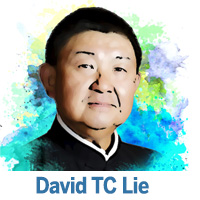China’s recent two sessions offered a clear window into the country’s direction in the coming years. They laid out a compelling roadmap, focused on industrial innovation and nurturing what President Xi Jinping called “new quality productive forces”. Despite the complex challenges at home and abroad, China is steadily pushing forward. There’s a resilience in how the country is navigating these challenging times.
 What stands out most to me is how these moments reveal the underlying strength of China’s institutions — and the vital role of national unity. The goal of maintaining an economic growth rate of around 5 percent is both ambitious and grounded. The central government remains deeply committed to opening up, supporting private enterprises, and upholding the “one country, two systems” principle. And importantly, it continues to pursue peaceful solutions on the Taiwan question.
What stands out most to me is how these moments reveal the underlying strength of China’s institutions — and the vital role of national unity. The goal of maintaining an economic growth rate of around 5 percent is both ambitious and grounded. The central government remains deeply committed to opening up, supporting private enterprises, and upholding the “one country, two systems” principle. And importantly, it continues to pursue peaceful solutions on the Taiwan question.
Essence of US tariff measures
Now, let’s talk about the latest round of United States tariffs. It’s tempting to see this as just another trade war — but I believe that view misses the bigger picture.
READ MORE: China raises additional tariffs on US imports to 125%
What we’re witnessing isn’t just economic friction. It’s a sign of something deeper: a systemic shift. The US appears to be trying to reshape not only its own government structure but also the global economic landscape. The aim? To consolidate capital, streamline governance, and re-establish American dominance in the world economy. The new tariffs are just one piece of that puzzle.
As businesspeople, it’s natural for us to feel uneasy about such moves. They disrupt markets and complicate decision-making. But as someone who has witnessed — and lived through —China’s reform and opening up over the past 40 years, I’ve learned one thing: Only a strong and stable China can offer a truly secure environment for business to thrive.
A lesson from history
A friend recently reminded me of a quote from Zeng Guofan, a statesman from the late Qing Dynasty (1644-1911): “To accomplish great undertakings, vision must come first, and ability must follow.”
This saying really resonated with me, especially in light of recent developments involving the proposed port deal between CK Hutchison Holdings and BlackRock.
Let’s take the case of CK Hutchison. After the Trump administration pressured the Panamanian government, it would ultimately lead to the cancellation of CK Hutchison’s port concessions at the Panama Canal. Now, as the company looks to sell its overseas port assets — including two key ports in Panama — China’s regulators are stepping in.
Why? Because under China’s Anti-Monopoly Law, any business activity — no matter where it takes place — that affects competition within China can fall under Chinese jurisdiction.
Right now, the State Administration for Market Regulation is reviewing the deal. They haven’t blocked it, but they’re assessing whether the transaction could threaten China’s national economic security. If it does, they may impose conditions — or even reject it outright.
It’s important to understand that this approach isn’t unique to China. The US has long applied similar antitrust principles with extraterritorial reach.
More than just business
From a purely commercial standpoint, some see this deal as something only a visionary—someone like Superman—could pull off. But when you look at it through the lens of national security and the common good, the picture changes.
ALSO READ: Scattergun tariffs bad for all
These kinds of decisions go far beyond profit and loss. They touch on the long-term interests of the country, the well-being of its people, and yes, the rights of shareholders too. It’s a delicate balance.
At the end of the day, I trust that those responsible will make a decision that reflects wisdom, responsibility, and a clear sense of vision.
The author is a member of the National Committee of the Chinese People’s Political Consultative Conference and chairman of China New Era Foundation.
The views do not necessarily reflect those of China Daily.


